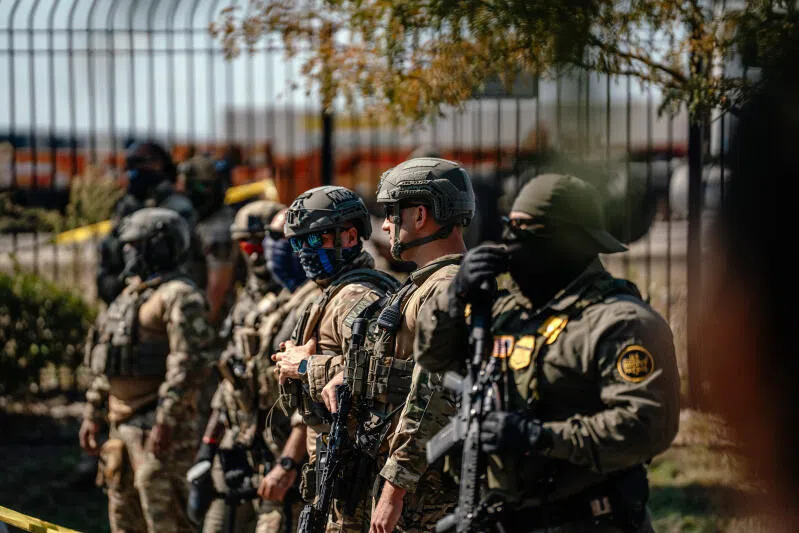Illinois sues to block US National Guard deployment in Chicago
Sign up now: Get ST's newsletters delivered to your inbox

Federal law enforcement officers line up in the Brighton Park neighbourhood in Chicago, on Oct 4, 2025.
PHOTO: JAMIE KELTER DAVIS/NYTIMES
Follow topic:
CHICAGO - The Democratic-led US state of Illinois filed suit on Oct 6 to block President Donald Trump’s deployment of hundreds of National Guard troops to Chicago.
The lawsuit comes one day after a federal judge in Oregon temporarily blocked the Republican president
Mr Trump over the weekend authorised the deployment of 700 National Guard soldiers to Chicago despite the opposition of elected Democratic leaders including the mayor and Governor JB Pritzker.
In a lawsuit filed in federal court in Illinois, the state attorney-general Kwame Raoul and counsel for Chicago accused Mr Trump of using US troops “to punish his political enemies.”
“The American people, regardless of where they reside, should not live under the threat of occupation by the United States military, particularly not simply because their city or state leadership has fallen out of a president’s favour,” they said.
“Far from promoting public safety in the Chicago region,” they wrote, Mr Trump’s “provocative and arbitrary actions have threatened to undermine public safety by inciting a public outcry.”
“Illinois asks this Court to declare these actions unlawful and enjoin them, immediately as well as permanently,” they added.
Homeland Security Secretary Kristi Noem defended the plan to send troops to Chicago, claiming on Fox News show Fox & Friends Weekend that the third-largest city in the United States is “a war zone.”
Mr Pritzker, responding on CNN, accused Republicans of seeking to “create the war zone, so that they can send in even more troops.”
A CBS poll released on Oct 5 found that 58 per cent of Americans oppose deploying the National Guard to US cities.
But Mr Trump – who spoke last week of using the military for a “war from within” – shows no sign of backing down.
On Oct 5 he claimed, falsely, that “Portland is burning to the ground. It’s insurrectionists all over the place.”
‘Constitutional law, not martial law’
Mr Trump’s campaign to use the military on home soil hit a roadblock on Oct 4 in Portland when a federal court ruled the deployment was unlawful.
Mr Trump has repeatedly called Portland “war-ravaged,” but District Judge Karin Immergut issued a temporary block on troop deployment, saying “the president’s determination was simply untethered to the facts.”
“This is a nation of Constitutional law, not martial law,” wrote Ms Immergut, a Trump appointee.
Although Portland has seen scattered attacks on federal officers and property, the administration failed to demonstrate “that those episodes of violence were part of an organised attempt to overthrow the government as a whole,” she said.
The Trump administration is appealing the ruling, White House Press Secretary Karoline Leavitt told reporters on Oct 6.
“With all due respect to that judge, I think her opinion is untethered in reality and in the law,” Ms Leavitt said. “We’re very confident in the president’s legal authority to do this.”
“The president wants to ensure that our federal buildings and our assets are protected and that’s exactly what he’s trying to do,” she said.
Days of tense scenes in Chicago turned violent on Oct 4 when a federal officer shot a motorist
Illinois and Oregon are not the first states to file legal challenges against the Trump administration’s deployment of the National Guard.
California filed suit
A district court judge ruled it unlawful but the deployment was upheld by an appeals court panel. AFP

